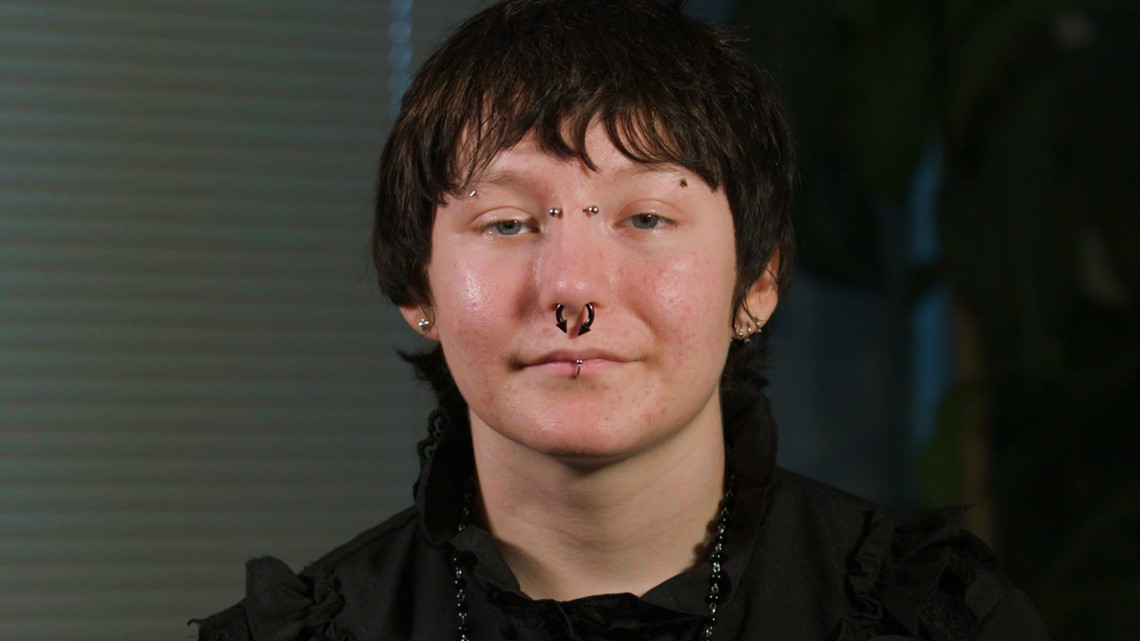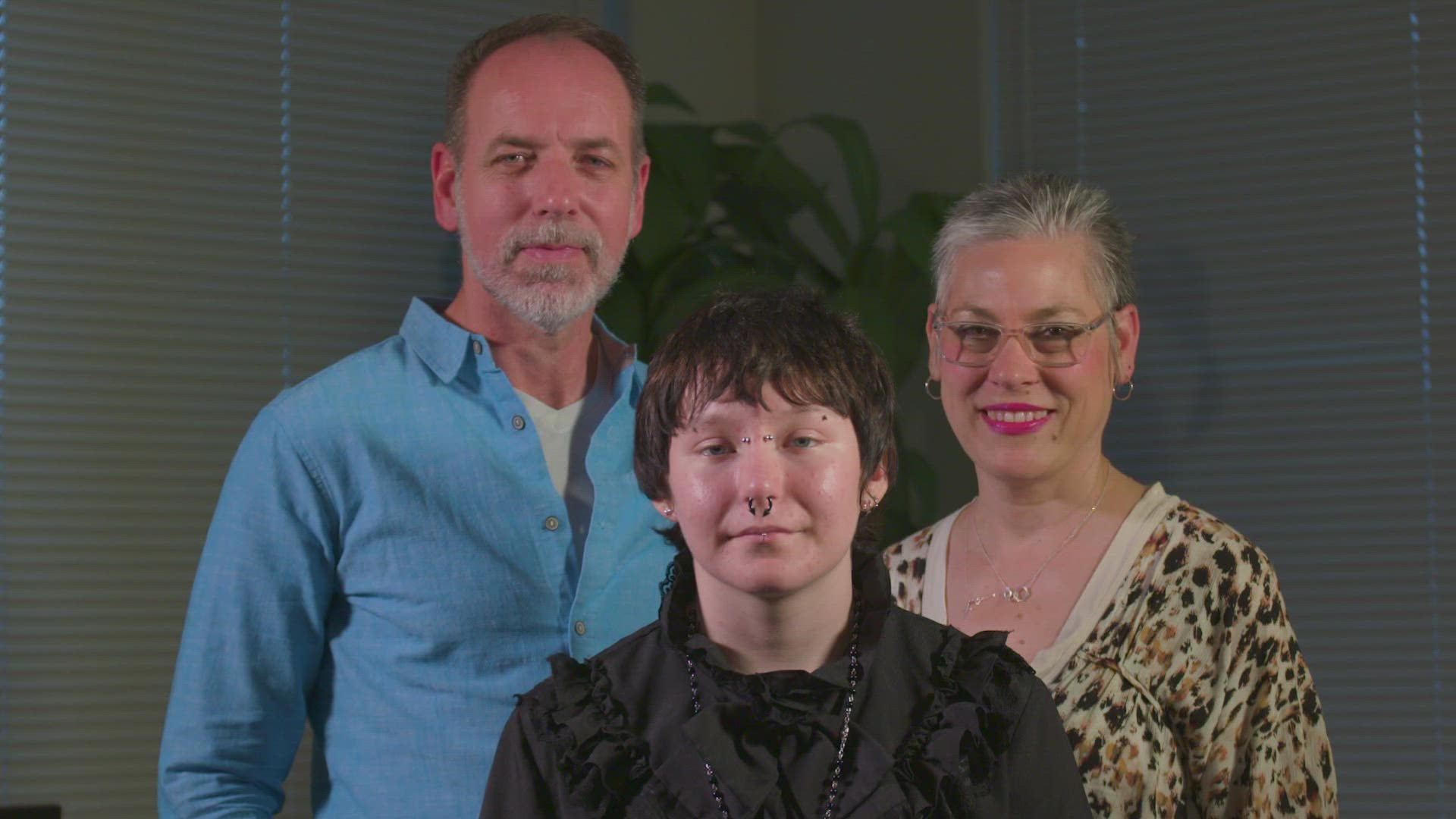Editor’s note: This story contains depictions of suicide and may not be appropriate for some readers.
If you or someone you know is in crisis, call the National Suicide Prevention Lifeline at 800-273-8255, text HOME to 741741 or visit Vibrant Emotional Health’s Safe Space for digital resources.
When Ollie Hartz told his parents he was transgender, there was a range of emotions to process.
Navigating the transition with family, friends and themselves can be heart-wrenching. More than half of all transgender teens have attempted suicide.
However, as Ollie’s family journeyed to accept him, they not only learned acceptance but found a new joy as well.
“We've lost, you know, Ainsley, but we've gained Ollie,” said Kathy Kunst, Ollie’s mother.
The dead name
If we're lucky, our earliest moments in this world are documented, printed on paper and saved. They can be a reminder of just how much things can change.
“In my mind, I knew we brought home Ainsley Marie. That's what I knew,” said Kunst.
Ainsley Marie was adopted as a newborn by Kunst and her then-husband Jason Hartz. At the age of 14, Ainsley came to the family with an announcement the Maple Valley parents didn't see coming.
“We get emails from the school to ‘Oleander Hartz,’” said Jason Hartz. “And we were like, ‘Who's Oleander?’ It's like, you know, it's Ainsley.”
Ainsley's time was up.
“[Ainsley] kind of squat down in front of us and just started crying,” said Hartz. “I kind of said, 'Are you trying to tell us that you're trans?' And [Ainsley] nodded. Yes. And the first words out of his mouth is like, ‘Will you, will you stop loving me?’”
Ainsley chose a new name: Oleander or Ollie for short. Ollie wanted his parents to accept and address him as a male.
“I started sobbing for sure,” said Ollie. “I was looking up shelters just in case, that if, they kick me out.”
Ollie’s parents said they did everything they could to support their son. But Kunst recalled struggling to let go of Ainsley and accept Ollie.
“I would have to say that that's taken some couple years to do that,” Kunst said. “I remember grieving deeply. 'I'm losing a daughter,' and this is what I knew.”
“[Ollie] would say, you know, ‘Ainsley is my dead name,’” Hartz said. “He would say many times, like, 'Dad, does that bother you?’ And we're like, 'A little bit.’ But you know, we would have to just sort of just process it and get through it.”


Ollie’s parents said many of their friends and family initially believed Ollie was too young to make a decision of this magnitude. Ollie’s parents said some people in their circle didn’t understand it, including using Ollie’s preferred pronouns as a form of respect.
“I felt that God put me in a girl's body instead of a boy’s,” said Ollie, who is now 15 years old. “And I was really confused for like a big part of my childhood about that.”
Transgender suicide risk
Ollie's gender journey has taken him through dark territory.
“I've gotten chased by a car full of kids who were screaming slurs at me and saying that I will never be a real man,” Ollie said. “I was at a place in my life where I didn't have anyone, anything. That's when I planned this suicide date.”
That suicide date came and went. Ollie eventually confided in a school counselor and his parents were notified he was having thoughts of harming himself.
Ollie was experiencing a level of trauma that many in the transgender community face. A 2020 study published in the Journal of Interpersonal Violence found 82% of transgender people have considered killing themselves. An alarming 56% of transgender teens have attempted suicide at least once.
Desperate for help, Ollie's parents admitted him to Smokey Point Behavioral Hospital in Marysville – where staff say more than 10% of underage patients identify as transgender or non-binary.
“Depression is huge. Anxiety is off the charts with those that suffer from gender dysphoria,” said David Vandegrift, director of family services at Smokey Point Behavioral Hospital. “It's a complex picture – self-harm, self-injury. That includes drug and alcohol addictions, dropping out of school because they don't want to be bullied, self-mutilation and self-injury, burning, pulling hair out, cutting, unsafe sex. [It] all comes from just not having a way to express the pain they're in.”
Recently Smokey Point launched a new program for transgender and non-conforming trans teens. The program treats mental health issues first and works with parents to foster understanding and support around a child's gender identity. However, some parents refuse to accept their child’s transgender identity, Vandegrift said.
“It's more of a presence of hostility,” Vandegrift said. “Like, ‘I don't want to deal with this,’ or ‘You were born male. This is your name. Then stick to it.’ One of the things that I encourage parents to do is to grieve and to mourn what actually may never have been in the first place. How they saw their child, because the feelings [the child has] are typically [there] from a really early age.”
Transgender acceptance
Acceptance for transgender people isn't as widespread as many hope. 32% of U.S. adults say greater acceptance of transgender people is a bad thing for society, according to a 2021 Pew Research Center Survey.
“Stop the stigma,” said Fredericka Ford, CEO of Smokey Point Behavioral Hospital. “Our focus really is enhancing the family support to understand who their child is so that they can be successful in life.”
Ollie spent several weeks at Smokey Point, and he and his parents are now part of the outpatient program. Ollie’s parents said they have accepted Ollie as their son and they are incredibly proud of his strength.
“Just to see him be authentically him and just grow as the person that he has known that he's been inside all these years. It's been actually really amazing,” Hartz said.
Going through old childhood photos doesn’t upset Ollie. Instead, it offers a sense of relief.
“Looking back at my younger photos, I really just wanted to give the younger me a hug,” Ollie said. “And just tell them everything's gonna be alright.”
Resources for transgender teens and parents
- The New York Times’ The ABCs of L.G.B.T.Q.I.A.+ (a quick-read primer on basic identities)
- Breaking Binaries Worksheet: Use this worksheet to understand how you personally understand your assigned birth sex, gender expression, gender identity, and sexual orientation. It can be a conversation starter about non-binary identities.
- Test Prep Insight's College Guide and Resources For LGBTQ Students: This guide covers all aspects of college life for LGBTQ students, including common challenges, tips for integrating into campus life, and perhaps most importantly, guidance from experts on navigating college relationships.
- Resources from the American Psychological Association:
- GLAAD’s Tips for Allies of Transgender People
- HRC’s Be an Ally - Support Trans Equality
- Action Tips for Allies of Trans People
- Trans Ally Resources
- them’s Trans Voices series on YouTube
- PFLAG’s We Are All Allies offers some quick starting points for all allies
- 10 ways to be an ally to Black LGBT people
- The Guide to Being a Straight Ally: Learn more about what it means to be a straight ally and get some great tips and tools to being more supportive of your LGBTQ, friends, family, and colleagues.
- Hachett’s Essential Reading on the LGBTQ Journey
See more resource lists here:
- Buffer's 50+ Resources for LGBTQIA Allies
- Glaad's LGBTQ Resource List

